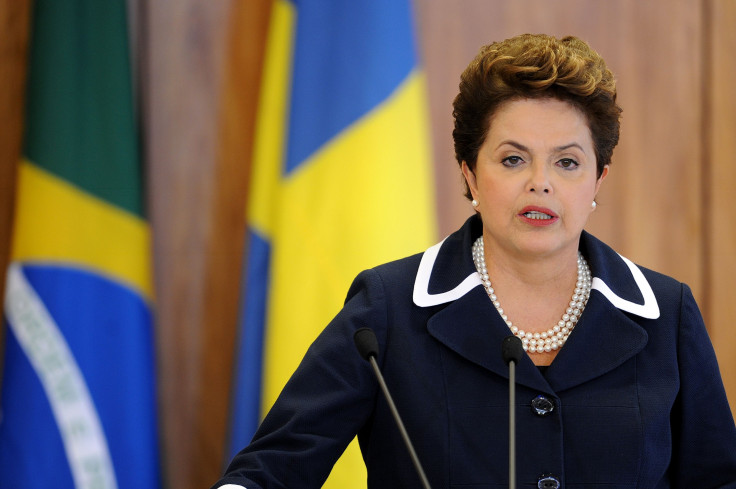Football Politics: Brazil's Humiliation At World Cup Casts Doubts On Rousseff's Political Future

“Where is all the social unrest?” FIFA President Sepp Blatter had asked the audience at a conference in Rio de Janeiro last Wednesday, before declaring World Cup 2014 “a success.” However, as Brazil slowly recovers from its worst-ever performance in the tournament, Blatter’s proclamation, it's feared, may have come too soon.
Reports of sporadic incidents of vandalism are trickling in from Sao Paulo, Brazil's largest city, and other parts of the country. And, with presidential elections around the corner, the Brazilian team's on-field performance does not bode well for President Dilma Rousseff, who has been a frequent target of the protesters since Brazil announced its plans to host the World Cup.
The protests, which began in 2013, and were initially organized against increased bus fares, later morphed into a movement targeting police brutality, government corruption and overspending, after an estimated $11 billion was spent on preparing to host the World Cup at a time when a number of infrastructure projects remain underfunded and unfinished.
Signs of unrest were visible as early as half-time during Tuesday’s semi-final match in Belo Horizonte when Germany took a 5-0 lead, triggering angry slogans and chants from Brazilian soccer fans against Rousseff. Germany went on to win the game 7-1 for a spot in the final.
Following Brazil’s debacle, the protests against the Rousseff administration, which had slowly faded into the background after the Brazilian team's respectable performance at the start of the tournament provided hope to a nation full of soccer fans, might witness a rebirth.
If the protests are renewed, it would come as a blow to the beleaguered Rousseff, whose approval rating fell to 48 percent in April from 55 percent in February, according to a poll cited by The Economist.
Although Rousseff still maintains a lead over her closest rivals -- Eduardo Campos of the Brazilian Socialist Party and Aecio Neves of the Brazilian Social Democracy Party -- her dwindling ratings make defeat a definite possibility in October.
Stubbornly high inflation, which has remained above the 4.5 percent target through Rousseff’s tenure coupled with slowing growth -- Brazil’s first quarter growth rate was half of what it was in the previous quarter -- has further fuelled people’s anger against the administration. This has also made the task of removing regulated price caps in order to accelerate growth even more difficult for the government. Rousseff’s administration has also been marred by allegations of corruption at Petrobras, a state-controlled oil giant, which is set to face a congressional inquiry. However, the fact that unemployment rates in the country remain extremely low could possibly count in Rousseff’s favor.
While it’s too soon to say what effect Brazil’s defeat would have on Rousseff’s political fortunes, the ruling Workers’ Party will definitely hope that the team's performance on the soccer pitch will not have any bearing on voter sentiment at the polls.
© Copyright IBTimes 2024. All rights reserved.












